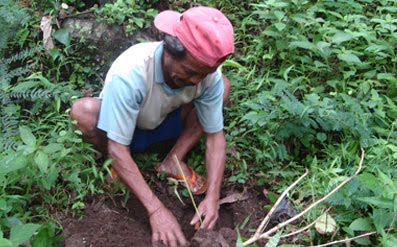
West Bali Agroforestry
Bring Back Our Forests - Agro-forestry, Tree-planting, Water Conservation & Education in West Bali (Jembrana) and Central Bali (Gesing).
In August 2011, IDEP began a new campaign to end deforestation in Bali. One project team, led by IDEP's project manager, Sayu Mahayuni, is currently working with close local partners to re-vegetate one of Bali's most deforested jungle areas in Yehembang, West Bali.
The goal of the project is to educate and train community members on agroforestry techniques to sustainably eliminate deforestation and ensure a durable water-source.
IDEP's current activities include planting trees, organic seed saving, and environmental education and training. Working with local environmental groups and schools, IDEP is planting solid trees on high-land and mangrove trees along the erosion-prone coastline. To date, over 7,000 trees have been planted.
Additionally, IDEP is working with the local community to build a seed garden in Jembrana. Seeds produced will include Mahogany and Jackfruit trees and other productive plants like Cacao, which are planted to prevent soil erosion. By producing their own seeds, the Yehembang community will maintain biodiversity and become self-reliant.
Currently, IDEP is teaching students in 5 youth groups, 5 elementary schools, and 1 secondary school about the environment. A recent visit by IDEP's team to the schools confirmed the success of these classes; the students are learning creative and fun techniques of environmental education through song writing, class performances and hands-on gardening. IDEP plans to continue with these educational programs and include in-house permaculture and seed-saving gardens tended by the students.
Tree Planting In Gesing
In August 2011, IDEP expanded its productive tree-planting program to Gesing, a mountainous area located in central Bali. Currently, farmers are cutting down trees in Gesing at an alarming rate to keep up with the demand for timber for construction in the south for hotels, restaurants, and houses. This mass deforestation has several consequences: land erosion, landslides, destruction of animal habitats, and loss of biodiversity.
Gesing, through rainwater catchment systems, is a main supplier of water for South Bali, including Ubud, Kuta, Nusa Dua and all the major touristic area of Bali. Since rainwater is naturally caught in the soil, it is important that local farmers use organic farming methods, NOT chemicals and pesticides, and reforest trees to prevent soil erosion and landslides.
In partnership with farmers and landowners, IDEP plans to train farmers and community members on organic farming methods, build a demo organic garden site, and plant at least 5,000 productive trees this year. In addition to planting trees, IDEP will monitor the project to ensure sustainable agroforestry practices.
Productive trees are trees that have multiple uses. Products from a tree can include wood bark, fruit, leave, firewood and timber, which can be sold and replanted. By planting productive trees IDEP will create economic opportunities for farmers and community members who will look after their forest.
IDEP is planting 3 types of productive trees: Majegau (Dysoxylum densiflorum), Jabon (Anthocephalus cadamba), and Kejimas (Duabanga Mollucana). This are some of the most demanded woods in balinese temple construction practice.
Click here to make a donation and help keep this project running!.
Completed Programmes
|






